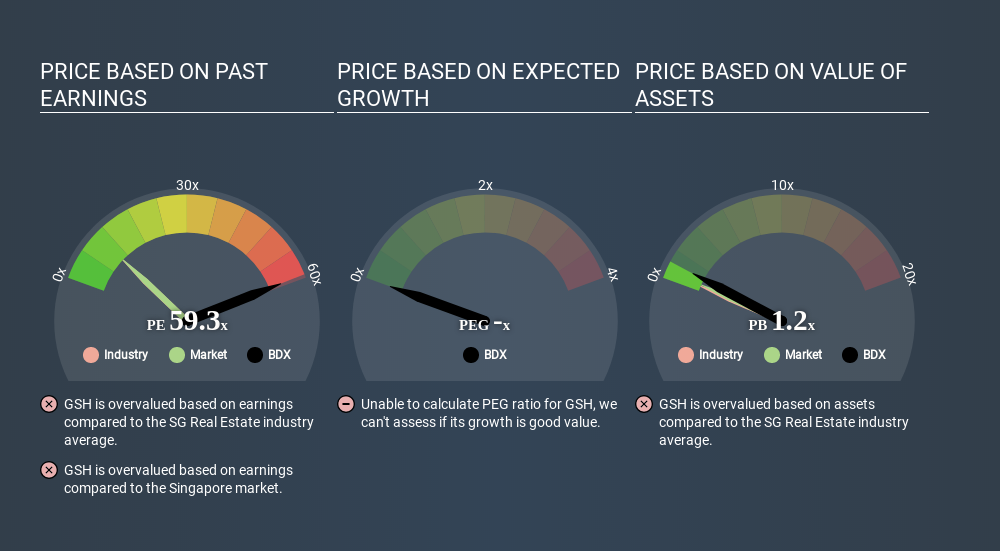- Singapore
- /
- Real Estate
- /
- SGX:BDX
How Does GSH's (SGX:BDX) P/E Compare To Its Industry, After The Share Price Drop?

To the annoyance of some shareholders, GSH (SGX:BDX) shares are down a considerable 31% in the last month. The recent drop has obliterated the annual return, with the share price now down 22% over that longer period.
All else being equal, a share price drop should make a stock more attractive to potential investors. In the long term, share prices tend to follow earnings per share, but in the short term prices bounce around in response to short term factors (which are not always obvious). So, on certain occasions, long term focussed investors try to take advantage of pessimistic expectations to buy shares at a better price. One way to gauge market expectations of a stock is to look at its Price to Earnings Ratio (PE Ratio). A high P/E implies that investors have high expectations of what a company can achieve compared to a company with a low P/E ratio.
Check out our latest analysis for GSH
Does GSH Have A Relatively High Or Low P/E For Its Industry?
GSH's P/E of 59.28 indicates some degree of optimism towards the stock. As you can see below, GSH has a much higher P/E than the average company (10.1) in the real estate industry.

GSH's P/E tells us that market participants think the company will perform better than its industry peers, going forward. Clearly the market expects growth, but it isn't guaranteed. So further research is always essential. I often monitor director buying and selling.
How Growth Rates Impact P/E Ratios
Generally speaking the rate of earnings growth has a profound impact on a company's P/E multiple. If earnings are growing quickly, then the 'E' in the equation will increase faster than it would otherwise. That means unless the share price increases, the P/E will reduce in a few years. A lower P/E should indicate the stock is cheap relative to others -- and that may attract buyers.
GSH increased earnings per share by a whopping 28% last year. But earnings per share are down 32% per year over the last five years.
Don't Forget: The P/E Does Not Account For Debt or Bank Deposits
Don't forget that the P/E ratio considers market capitalization. So it won't reflect the advantage of cash, or disadvantage of debt. Theoretically, a business can improve its earnings (and produce a lower P/E in the future) by investing in growth. That means taking on debt (or spending its cash).
Spending on growth might be good or bad a few years later, but the point is that the P/E ratio does not account for the option (or lack thereof).
So What Does GSH's Balance Sheet Tell Us?
Net debt totals 88% of GSH's market cap. This is enough debt that you'd have to make some adjustments before using the P/E ratio to compare it to a company with net cash.
The Bottom Line On GSH's P/E Ratio
With a P/E ratio of 59.3, GSH is expected to grow earnings very strongly in the years to come. It's good to see the recent earnings growth, although we note the company uses debt already. But if growth falters, the relatively high P/E ratio may prove to be unjustified. Given GSH's P/E ratio has declined from 86.3 to 59.3 in the last month, we know for sure that the market is significantly less confident about the business today, than it was back then. For those who prefer to invest with the flow of momentum, that might be a bad sign, but for a contrarian, it may signal opportunity.
Investors have an opportunity when market expectations about a stock are wrong. If the reality for a company is better than it expects, you can make money by buying and holding for the long term. Although we don't have analyst forecasts shareholders might want to examine this detailed historical graph of earnings, revenue and cash flow.
Of course, you might find a fantastic investment by looking at a few good candidates. So take a peek at this free list of companies with modest (or no) debt, trading on a P/E below 20.
If you spot an error that warrants correction, please contact the editor at editorial-team@simplywallst.com. This article by Simply Wall St is general in nature. It does not constitute a recommendation to buy or sell any stock, and does not take account of your objectives, or your financial situation. Simply Wall St has no position in the stocks mentioned.
We aim to bring you long-term focused research analysis driven by fundamental data. Note that our analysis may not factor in the latest price-sensitive company announcements or qualitative material. Thank you for reading.
About SGX:BDX
GSH
An investment holding company, engages in the development and sale of properties in Malaysia and China.
Mediocre balance sheet very low.
Market Insights
Community Narratives





